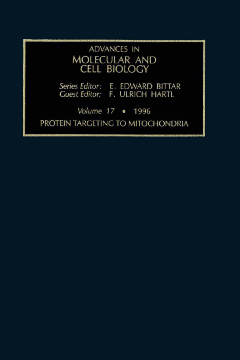
Additional Information
Book Details
Abstract
A large number of newly-synthesized polypeptides must cross one or several intracellular membranes to reach their functional locations in the eukaryotic cell. The mechanisms of protein trafficking, in particular the post-translational targeting and membrane translocation of proteins, are of fundamental biological importance and are the focus of intensive research world-wide. For more than 15 years, mitochondria have served as the paradigm organelle system to study these processes. Although key questions, such as how precisely proteins cross a membrane, still remain to be answered, exciting progress has been made in understanding the basic pathways of protein import into mitochondria and the components involved. In addition to a fascinating richness and complexity in detail, the analysis of mitochondrial protein import has revealed mechanistic principles of general significance: Major discoveries include the demonstration of the requirement of an unfolded state for translocation and of the essential role of molecular chaperones on both sides of the membranes in maintaining a translocation-competent conformation and in protein folding after import. It is becoming clear how a polypeptide chain is "reeled" across the membrane in an ATP-dependent process by the functional cooperation of membrane proteins, presumably constituting part of a transmembrane channel, with peripheral components at the trans-side of the membrane.
In this volume, eminent experts in the field take the time to review the central aspects of mitochondrial biogenesis. The logical order of the 16 chapters is determined by the sequence of steps during protein import, starting with the events taking place in the cytosol, followed by the recognition of targeting signals, the translocation of precursor proteins across the outer and inner membranes, their proteolytic processing and intramitochondrial sorting, and finally their folding and oligomeric assembly. In addition, the mechanisms involved in the export of mitochondrially encoded proteins as well as recent advances in understanding the division and inheritance of mitochondria will be discussed.
